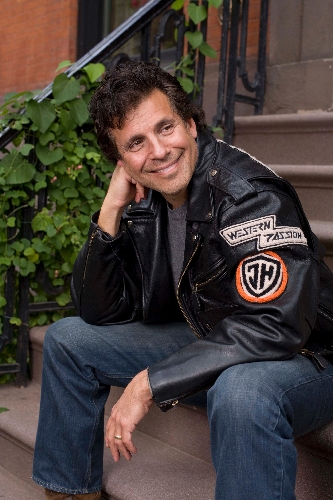Jake Ehrenreich mines humor, drama in ‘A Jew Grows in Brooklyn’

Two baby boomer New York Jews are burning up the phone line.
“Growing up I was a pretty huge Mets fan,” says the interviewee, and as New York sports allegiances go, that’s about right for a Brooklyn-ite, as the Mets more or less replaced the beloved, departed (and traitorous) Dodgers in the affections of that borough.
His interviewer counters that he is a lifelong Yankee loyalist right down to his Bronx-born toes, but apparently has violated some heretofore unknown religious division of New York fandom.
An interborough clash is brewing.
“You’ve got to admit, the Mets were the Jewish team,” Brooklyn Boy insists.
Huh? “They were downtrodden. They were the underdog. You had to root for the Mets if you were a Jew.”
Bronx Boy informs Brooklyn Boy that his pinstriped passions were preordained by geography, even being able to see old Yankee Stadium from his apartment window. “Then I’ll give you special dispensation,” he concedes.
What a bubbeleh. (Don’t worry. It’s a Yiddish endearment.) And yes, Bronx Boy admits respect for Brooklyn Boy, given he can sing the “Meet the Mets” theme in Yiddish. He even did it on stage, which brings us to Jake Ehrenreich’s “A Jew Grows in Brooklyn,” pulling into the Suncoast for a three-performance engagement by the playwright/star this weekend, invited by the Jewish Repertory Theatre of Nevada.
“One review said this show would even please a group of Episcopalian ministers,” says theater company co-director Norma Morrow about the off-Broadway show, now on tour. “We thought it was a great story for the audience members of Las Vegas because a lot of them grew up in the ’60s, with the stickball and the Catskills. It’s got laughter and sentimentality. It’s someone’s life.”
Unabashedly affectionate, “Brooklyn” is a journey through the 54-year-old’s life growing up in ’60s New York as the child of Holocaust survivors. The show (also a book and upcoming PBS documentary) is an Ehrenreich tour de force, the star supported only by musician-singers.
“His gentle nostalgia (bears) witness to a nearly departed generation, language and way of life,” wrote Wendy Rosenfield in the Philadelphia Inquirer, adding that it’s “in the same elevated company as Billy Crystal’s ‘700 Sundays’ or Chazz Palminteri’s ‘A Bronx Tale.’ ”
Palminteri/Crystal comparison? Quite a kudo. “It’s extremely flattering, but I’m no Billy Crystal,” he says. “They’re not going to say, ‘Billy can’t host the Oscars this year, let’s call Jake.’ ”
Warmly reminiscing about the hey-yo! Nooo Yawk-y characters of his youth — accompanied by photos narrating his story on a big screen — he recounts playing stickball in the streets, performs Borscht Belt shtick from his Catskills days (“I’m here to give you super sex! … I’ll take the soup” — rimshot!), wails on drums, tears into a ’60s rock medley and embarrasses every awkward, mortified bar mitzvah boy in history by revealing his own picture and relating his own experience from that ritualistic celebration.
“People swear to me, ‘That’s my picture!’ ” he says. “Everything you need to know about a Jew’s life is in their bar mitzvah photograph. Any Jew who goes to therapy, just give it to the therapist.”
Mostly, “Brooklyn” recalls a time and place that is both specific and universal in its celebration of family and friends.
“Some things are funnier to people who know some Yiddish and the New York meaning, but when we were in Toronto, our sound guy, who’s got all these tattoos, and his girlfriend, who has a nose ring, we went out for a drink after the opening,” he remembers.
“His girlfriend said, ‘You know what my favorite part is? The Yiddish lullaby that your mother sang.’ And these people don’t even know what a Jew is.”
Turning deeply, sometimes painfully dramatic, however, American-born Ehrenreich delves into the story of his parents, who endured the Holocaust while imprisoned in a Siberian work camp and lived in a homeless shelter upon making it to this country.
“My mother spoke about it all the time. But my father never spoke about it until I became an adult and he became a great writer and scholar and felt his obligation was to talk about it,” he says, recalling — with an audible catch in his throat – when his dad finally saw the show before his death.
“He was in a wheelchair, he had Parkinson’s disease, and he said to me: ‘I feel like I had a cure for Parkinson’s because I didn’t shake once while I watched the show.’ I see my father onscreen, giving testimony for (Steven Spielberg’s) Shoah Foundation, and he’s talking to me. I say, ‘Hey, Pop’ under my breath every night. It’s a visit.”
Ultimately, he says, “A Jew Grows in Brooklyn” is an entertaining framework for an essential message.
“The story is this journey from an immigrant kid’s perspective, and how people can overcome the challenges in their lives,” he says. “I use my family’s story, but it’s supposed to be evocative of everyone’s story. I hope people leave feeling good and say, ‘I get it. I have things in my life that are difficult, but I can focus on the positive.’ ”
One last thing: The Yankees did have a Jewish player (Ron Blomberg).
“Hey, even I’m proud of the accomplishments of the Yankees,” Brooklyn Boy admits to Bronx Boy. “Of course, it’s not the ’69 Mets.”
Wanna step outside, Brooklyn Boy? Let’s have this out on neutral turf.
Say, Staten Island.
Contact reporter Steve Bornfeld at sbornfeld@review journal.com or 702-383-0256.
PreviewWhat: “A Jew Grows in Brooklyn”
When: 8 p.m. Saturday,
2 and 7 p.m. Sunday
Where: Showroom at the Suncoast, 9090 Alta Drive
Tickets: $25, $35, $45 (636-7075; www.suncoastcasino.com)













